Governance
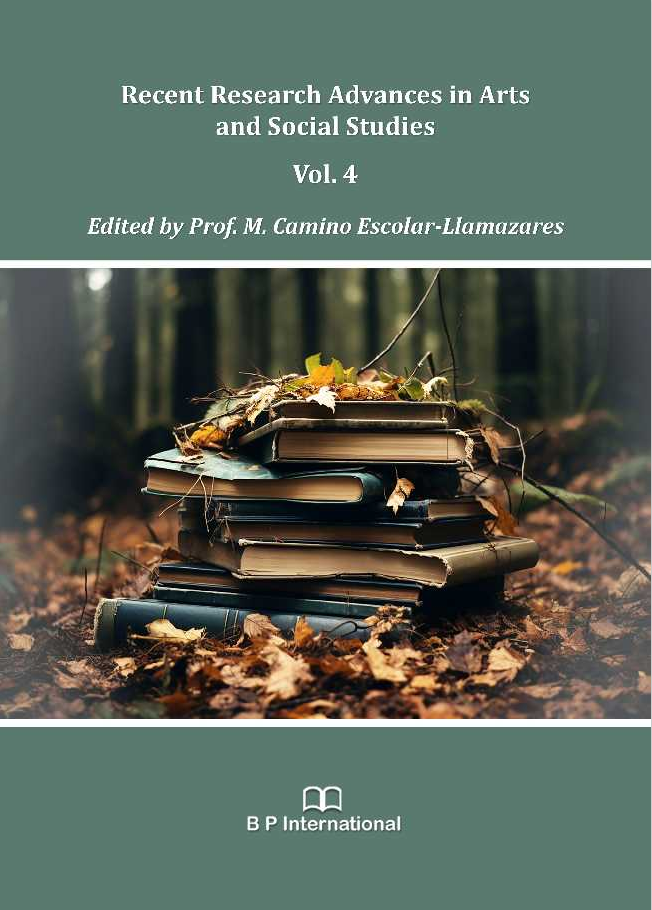
The Values of Portuguese International Development Cooperation: Review and update after 2013
Abstract:
In recent years, International Development Cooperation has assumed particular importance in scientific research and there are currently several studies of general scope or limited to a smaller geographical or thematic space, such as those that focus on national cooperation policies. In general, these works have sought not only to explain its historical, institutional and strategic evolution, but also to constitute a basis for reflection on a long journey of ideas, values and practices that it has been following and its results with partner countries. Portuguese Cooperation is no exception and, in general, all the publications that contextualize it refer directly or indirectly to the general values by which it is governed. However, there aren´t studies that identify the individual reference values of the action of the Cooperation actors in their practice of identifying, managing, and evaluating projects. In this article, we intend to identify the values considered as guiding principles of the action that the actors of the Portuguese Cooperation individually consider in the practices they develop. Such an intention constitutes a real innovation, since the only values identified so far are those that governments include in the strategies presented, more or less inspired by the documents of the European Union (EU) and the Development Assistance Committee (DAC) of the Organization for Economic Co-operation and Development (OECD).
Cite this paper:
Sangreman, Carlos e Raquel Faria (2024). ” The values of Portuguese International Development Cooperation: Review and Update after 2013″. In Recent Research Advances in Arts and Social Studies (Vol. 4), M. Camino Escolar-Llamazares (ed), 148-167. London: B P International
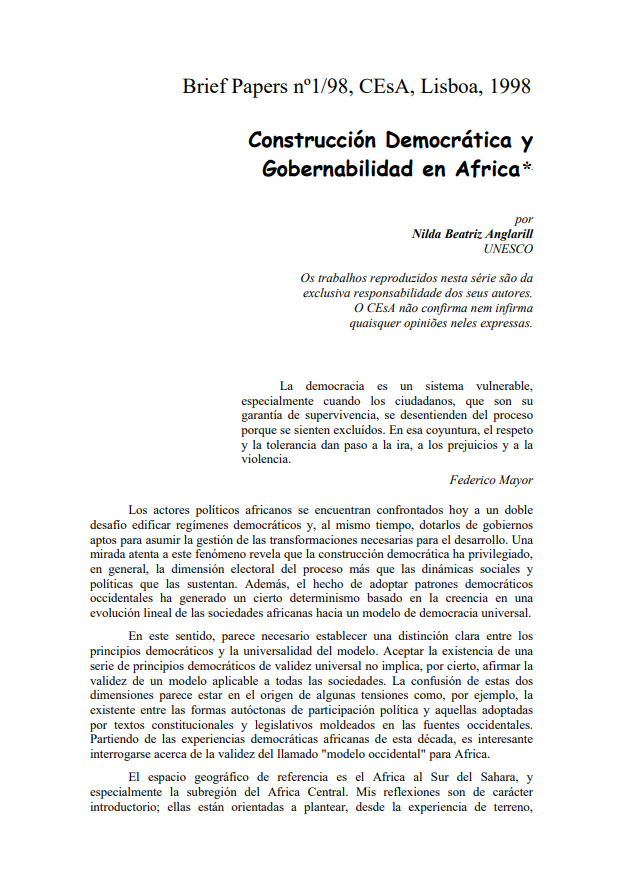
Brief Paper 1/1998: Construccíón Democrática y Gobernabilidad en Africa
Abstract:
African political players are today faced with a double challenge: building democratic regimes and, at the same time, equipping them with governments capable of managing the transformations necessary for development. A close look at this phenomenon reveals that democracy building has generally privileged the electoral dimension of the process rather than the underlying social and political dynamics. Moreover, the adoption of Western democratic standards has generated a certain determinism based on the belief in a linear evolution of African societies towards a model of universal democracy. In this sense, it seems necessary to make a clear distinction between democratic principles and the universality of the model. Accepting the existence of a series of democratic principles of unequivocal validity does not, of course, imply the affirmation of the validity of a model applicable to all societies. Confusion between these two dimensions seems to be at the root of certain tensions, such as that between indigenous forms of political participation and those adopted by constitutional and legislative texts based on Western sources. On the basis of the African democratic experiences of this decade, it is interesting to question the validity of the so-called “Western model” for Africa. Communication at the CESA 1997 Seminar: The Problematic of Development – History and a Transdiciplinary Perspective, Conference Construção Democrática e Contributos Actuais numa Governance em África (Democratic Construction and Current Contributions to Governance in Africa), 23 May 1997.
Quotation:
Comunicação no Seminário CEsA 1997: A Problemática do Desenvolvimento – Historicidade e Contributos Actuais numa Óptica Transdiciplinar, Conferência “Construção Democrática e ‘Governance’ em África”, 23 de Maio de 1997.
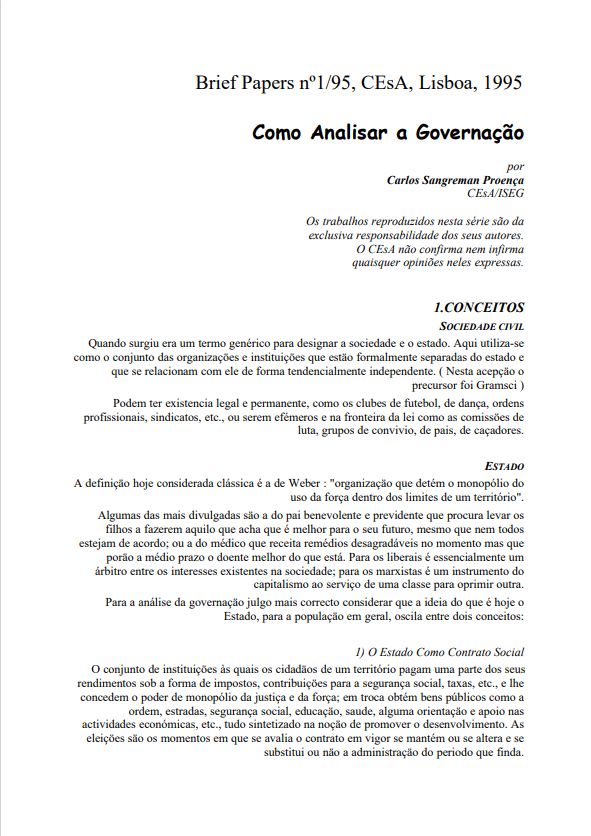
Brief Paper 1/1995: Como Analisar a Governação
Abstract:
Although the issue of Como analisar a governação is still at the beginning of the discussion in the scientific community, a set of criteria seems to be emerging, little by little, as consensual. For some of them, there is still the problem of which indicators to use, how to quantify them or what normative scale to define in order to assess them, and there are few practical applications of analysis to specific countries. And research needs to be done. The criteria for evaluating governance can be summarised in five groups, which can be applied to the notion of the Contract State and a softer version of the Arena State, where the interest groups that hold power assume the position of the medieval lord with the obligation to look after the welfare of the people, but never forgetting that his family and those close to him come first. Nobody is fully represented by another, and the further away that other is culturally and physically, the weaker the link. Thus, the population that feels that the Members of Parliament in Lisbon or Strasbourg are distant from its problems, tends socially to behave in defence, attack or seek alternatives, always with little credit for those who are far away and do not know each other.
Quotation:
Sangreman, Carlos. 1995. “Como analisar a governação”. Instituto Superior de Economia e Gestão – CEsA Brief Papers nº 1-1995.
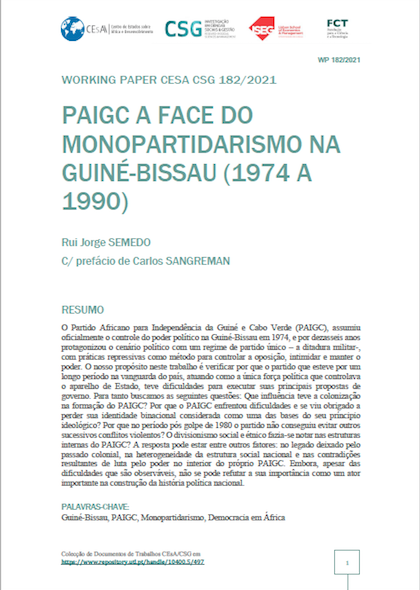
Working Paper 182/2021: PAIGC a Face do Monopartidarismo na Guiné-Bissau (1974 a 1990)
Abstract:
The African Party for Independence of Guinea and Cape Verde (PAIGC) officially took control of political power in Guinea-Bissau in 1974, and for sixteen years has starred in the political scene with a single-party regime – a military dictatorship–with repressive practices as a method to control the opposition, intimidate and maintain power. Our purpose in PAIGC a face do monopartidarismo na Guiné-Bissau (1974 a 1990) is to verify why the party that was for a long time at the forefront of the country, acting as the only political force that controlled the state apparatus, had difficulty executing its main government proposals. For this we seek the following questions: What influence did colonization have on the formation of the PAIGC? Why did the PAIGC face difficulties and were forced to lose its binational identity considered as one of the bases of its ideological beginning? Why in the post-coup period of 1980 could the party not prevent other successive violent conflicts? Was social and ethnic divisionism noted in the internal structures of the PAIGC? The answer may be among other factors: in the legacy left by the colonial past, in the heterogeneity of the national social structure and in the contradictions resulting from the struggle for power within the PAIGC itself. Although, despite the difficulties that are observable, it cannot be refuted its importance as an important player in the construction of national political history.
Quotation:
Semedo, Rui Jorge (2021). “PAIGC a face do monopartidarismo na Guiné-Bissau (1974 a 1990)”. Instituto Superior de Economia e Gestão – CEsA/CSG – Documentos de Trabalho nº 182/2021.
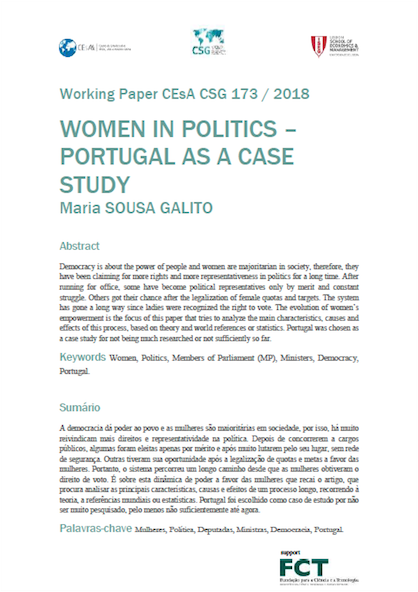
Working Paper 173/2018: Women in Politics: Portugal as a case study
Abstract:
Democracy is about the power of the people. In order to sustain, implies (at least) representativeness of its major groups. When majority rules minorities, lobbies complain when not happy and some of their demands are met; but the system doesn’t turn totally in their favor if it goes against the interests of a larger assembly. When minority rules the majority, problems arise (populism against elite, for instance); and sooner or later there’s a significant shift in society. Quantity gives power. Numbers do count in Democracy. Women are the majority of the population. It was not always so, but nowadays it’s an unquestionable fact. For cultural, institutional or socioeconomic reasons they were submissive for centuries to a system that did not recognize their public activity. They were not involved in decision making and rebel against that. At first, their demands were not met. But waves are changing. As long as democracy prevails and women’s numbers and percentages won’t drop, they’ll probably continue to raise awareness to their cause, increasing their power and influence in society. The evolution of women’s empowerment is the focus of Women in Politics: Portugal as a case study, that tries to analyze the main characteristics, causes and effects of this process, based on theory and world references or statistics. Portugal was chosen as a case study for not being much researched or not sufficiently so far.
Quotation:
Galito, Maria Sousa (2018). “Women in politics : Portugal as a case study”. Instituto Superior de Economia e Gestão – CEsA/ CSG – Documentos de Trabalho nº 173/2018.
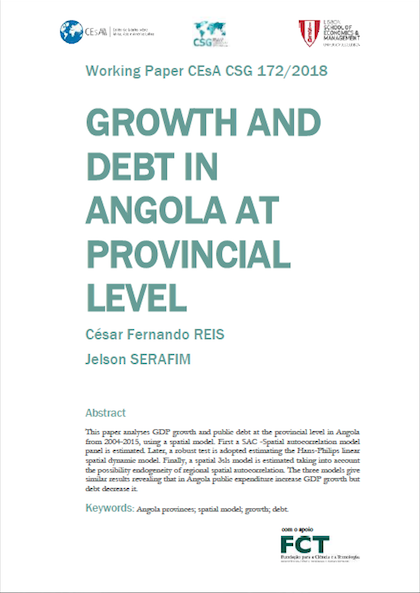
Working Paper 172/2018: Growth and Debt in Angola at Provincial Level
Abstract:
The relationship between growth and debt has attracted some research in past,(Eberhardt and Presbitero, 2015, Panizza and Presbitero, 2014, Kourtellos et al., 2013; Checherita-Westphal and Rother, 2012). This hypothesis has been tested for development countries and evidence from Africa countries restricted (Mistry, 1991; Ussain and Gunter, 2005; Mohamed, 2013; Owusu-Nantwi and Erickson, 2016). Reinhart and Rogoff (2010) find that growth rates fall in advanced and emerging market economies when the public debt-to-GDP ratio exceeds 90 percent and that high debt levels are correlated with higher inflation only in emerging markets. The Weak Government Hypothesis states that government fragmentation leads to higher public deficits and debt. This relation can be explained by government inaction, common pool problems or the strategic use of debt that arise in coalition governments (Ashworth, Geys and Heyndels, 2005). Therefore, this paper analyzes the relationship between debt and growth in Angola provinces from 2004-2015, using a spatial model. The spatial model is adequate in the present context as the focus are at regional level (Zhao, Tong and Qiao, 2002; chakravorty, 2003; Haddad, 2008; Barros, Faria and Araujo Jr., 2014) The SAC- Spatial autocorrelation model is adequate when the spatial autocorrelation is intense as it is in Angola context. The motivation for Growth and debt in Angola at provincial level is the following, first, growth at regional level is usually lower than at national level, revealing heterogeneity among Angola provinces that justifies the investigation between growth and debt. Second, regional public expenditure is taken into account since it is a component of the growth and debt. Third, regional public debt is not published in Angola and the access to it needs a ministry of finance accordance. This restricted access signifies that it is a political issue and therefore it may hide some political issues. Therefore, the use of it in and growth debt paper is curious. Additional, the Angola regional provinces are managed by MPLA- Movimento popular de Libertação de Angola members, the incumbent government, signifying that there is a centrality of power that increases the regional spatial correlation. This paper analyses GDP growth and public debt at the provincial level in Angola from 2004-2015, using a spatial model. First a SAC -Spatial autocorrelation model panel is estimated. Later, a robust test is adopted estimating the Hans-Philips linear spatial dynamic model. Finally, a spatial 3sls model is estimated taking into account the possibility endogeneity of regional spatial autocorrelation. The three models give similar results revealing that in Angola public expenditure increase GDP growth but debt decrease it.
Quotation:
Reis, César Fernando e Jelson Serafim (2018). “Growth and debt in Angola at provincial level”. Instituto Superior de Economia e Gestão – CEsA/ CSG –Documentos de Trabalho nº 172/2018.





